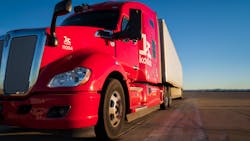Bridgestone partners with Kodiak to integrate smart tires with self-driving trucks
Kodiak self-driving trucks run on Bridgestone tires. Now, Kodiak is running with Bridgestone.
Bridgestone Americas made a minority investment in self-driving trucking company Kodiak Robotics, the two companies announced on June 16. As part of the partnership, Bridgestone will integrate its smart-sensing tire technologies and fleet solutions into Kodiak’s Level 4 autonomous trucks.
“One of the core promises of autonomous trucks is the potential to operate nearly 24/7 at peak safety,” Don Burnette, Kodiak’s co-founder and CEO, told FleetOwner. “Given that goal, it’s incredibly important that we minimize the likelihood of a tire issue and keep our trucks moving. Therefore, it's critical in the development and deployment of our self-driving trucks to be working hand in hand with an industry leader like Bridgestone.”
As they strive for a safer, more efficient, and sustainable future, both companies said they would use the partnership to test future autonomous and smart tire technologies to enhance vehicle intelligence.
“Automated vehicles offer a number of benefits to commercial fleet customers and society, including safer roads with fewer unexpected incidents, and upwards of 20% savings in fuel and efficiency,” said Paolo Ferrari, global chief solutions officer for Bridgestone Corporation and president and CEO of Bridgestone Americas.
Ferrari added that advancements in tire technologies are critical to the future of mobility and sustainability. “This investment will enable Bridgestone and Kodiak to work together to co-develop advanced mobility solutions with speed and precision that will revolutionize commercial trucking,” he said.
Smart tire technologies can collect data and track if weight is evenly distributed among truck and trailer wheels and axles, Burnette explained. “Weight distribution plays a critical role in vehicle dynamics, controllability, maneuverability, and thus safety and vehicle performance,” he said. “Kodiak can also use data collected from the smart-sensing tire technologies to optimize autonomous driving operations to minimize wear and tear on tires.”
Bridgestone can use the data Kodiak collects to better understand the causes of tire breakdown and optimize their tires for the near 24/7 operations that driverless trucks would enable. Burnette added that this data would also improve performance for tires on manually driven tractors.
Bridgestone Americas develops, manufactures, and markets a broad portfolio of original equipment and replacement tires, tire-centric solutions, mobility solutions, and other rubber-associated products. Bridgestone’s suite of cloud-based technologies leverages connected vehicle data to help predict tire health and maintenance, as well as optimize tire lifespan. The company’s vehicle platform technologies also provide tire intelligence to vehicle safety and autonomous systems.
“Additionally, smart tire technology will enable real-time tire monitoring, something that wasn’t previously possible,” Burnette said. “Thanks to Kodiak’s autonomous system, we can use data points from every driving function, like speed, throttle, braking, and acceleration in combination with Bridgestone’s sensors to better understand the impact driving has on tire wear.”
With a safety driver on board, Kodiak currently moves freight autonomously for its customers using its fleet of Level 4 self-driving long-haul trucks in Texas. Since they first started running, Kodiak trucks have used Bridgestone tires. It is planning to remove the safety driver from the cab and offer a truly driverless truck in 2023, Burnette told FleetOwner in May.
Together, Kodiak and Bridgestone will link vehicle-based and smart-sensing tire technologies to improve vehicle safety, fleet efficiency, and the next generation of autonomous trucking solutions.
Burnette noted that trucks cannot operate at peak levels without peak tire performance. “By utilizing Bridgestone’s best-of-breed smart tire technology, including their tire-mounted sensors and tire pressure monitoring systems, we can not only have real-time insights on the performance of our tires but also a deep understanding of how those tires will operate in the future, including being able to predict when breakdowns will occur before they do,” he explained.
Predictive maintenance is a significant piece of the autonomous trucking puzzle that many companies such as Kodiak are attempting to solve. “We are working with Bridgestone on smart sensing tire technologies and predictive maintenance models that will allow us to catch tire issues before they hit the road and maximize vehicle uptime,” Burnette said.
Burnette declined to disclose financial details of Bridgestone’s minority investment. But as part of the partnership, Nizar Trigui, Bridgestone’s CTO and group president of solutions businesses, will join the Kodiak Board of Directors “as an observer,” according to a joint press release.
The Bridgestone deal is just one of the more recent partnerships that Kodiak has secured. The AI company announced a partnership with South Korean conglomerate SK Group in May, which would pave the way for Kodiak to bring its self-driving technology to Asia. In April, Kodiak secured a contract with the Department of Defense to develop autonomous vehicles for Dover Air Force Base. Burnette’s team is also working with Hesai Technology to integrate its LiDAR into Kodiak trucks.
“Bridgestone’s investment is a huge moment for Kodiak and a great validation of our industry-leading autonomous system,” Burnette said.
About the Author
Josh Fisher
Editor-in-Chief
Editor-in-Chief Josh Fisher has been with FleetOwner since 2017. He covers everything from modern fleet management to operational efficiency, artificial intelligence, autonomous trucking, alternative fuels and powertrains, regulations, and emerging transportation technology. Based in Maryland, he writes the Lane Shift Ahead column about the changing North American transportation landscape.

